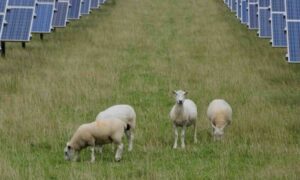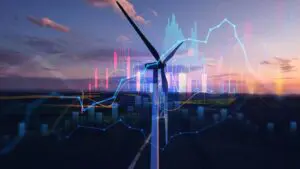Earlier this week the Intergovernmental Panel on Climate Change published a new report which outlined the need for “rapid, far-reaching, and unprecedented changes in all aspects of society” in order to limit global warming to 1.5°C.
Anyone who has even a vague understanding of Australia’s current political climate knew what what to expected in response from the Coalition, but its breath-taking stupidity is still something to behold, as Giles Parkinson pointed out on Tuesday.
In an effort to better gauge the government’s intent, RenewEconomy reached out to the Prime Minister Scott Morrison, Environment Minister Melissa Price, and Energy Minister Angus Taylor.
Their responses paint an important picture of how the Liberal Party intends to respond to the IPCC’s report and the recommendations made therein.
Instead of answering the questions posed to him, the Office of the Prime Minister directed me to his response to a journalist’s query, on Tuesday, regarding whether the government endorses the IPCC’s findings.
The Prime Minister, in his answer, made it clear that his government is going to do as little as possible in the face of overwhelming scientific evidence and consensus, while paying only the barest lip-service to the IPCC and the presented scientific evidence.
“We take all reports seriously and we consider all of them and assess those, as you would expect us to,” the Prime Minister said, before jumping into the government’s chosen way out.
“That report was delivered not to Australia, it was a global report. It didn’t contain any recommendations for any actions by Australia. It was making broader observations and Australia is part of that process.
“But I tell you what I’m about and what our government’s about; our government is about keeping our commitments. We have kept our commitments on Kyoto 1 as Greg [Hunt] as the Environment Minister at the time, knows all about.
“We will complete our commitments and beat them when it comes to Kyoto 2. We will meet our targets out to 2030 as well. We will meet the commitments that we have made.
“We have the lowest level of emissions per capita now in more than two decades and that is a good result. We had been working to achieve that and we will continue to do that.”
This is step one of the Coalition’s response – pay the minimum respect and give token answers to the importance of the IPCC’s report, before immediately pivoting to so-called accomplishments that hold very little water.
Yes, Australia has and will meet the Kyoto commitments, and it’s possible that the country will meet its 2030 renewable energy target – though, given the target’s mediocrity (combined with state efforts), this is hardly an achievement worthy of praise.
“But I tell you the other thing we’re going to do; that is, we’re going to do everything we can to get electricity prices down,” the Prime Minister continued.
“That is what the Minister For Getting Electricity Down is focused on, and that’s Angus Taylor. The Minister For Keeping The Commitments That We’ve Made on the Environment is Melissa Price, and that’s the job she’s doing. They’re going to do those jobs and they’re both going to do those jobs as part of our government.”
When RE reached out to Environment Minister Melissa Price for comment on the IPCC report it received the same talking points, but in brief:
“The IPCC is a trusted source of scientific advice. The Report presents the latest available science, which we will review and take into account in our deliberations on climate change policy.
“The intention of the Report is to provide information to policy makers without being policy prescriptive.”
Unfortunately, Minister Price’s prescribed comments seem to run contrary to her off-the-cuff remarks in an interview on ABC Radio’s AM program earlier this week in which she said she had not read the whole report but that she nevertheless felt the authors had “drawn a long bow.”
It would seem, therefore, that Minister Price is more than willing to parse her answers, depending on who she thinks is listening.
It’s little surprise that the Coalition government is mixing its message, but in the overall it is clear to see that the country’s current leaders are unwilling to part with the financial support of Australia’s coal barons.
Treasurer and former energy minister Josh Frydenberg summed that position up, with his repetition of the line: “If we take coal out of our energy system, the lights will go out on the east coast of Australia – it’s as simple as that.”
Minister Price echoed Frydenberg’s comments when asked what she thought of the IPCC’s recommendation that coal needed to be phased out by 2050.
“I just don’t know how you can say by 2050 you are not going to have technology, good clean technology, when it comes to coal. That would be irresponsible of us to commit to that,” she said.
For the Liberal Party, giving the IPCC’s report even the barest modicum of respect is a step too far, it seems, when there is even the slightest chance recognition of its key recommendations would mean undermining their own allegiance to the country’s coal industry.
Such respect would also seem to give far too much ammunition to the country’s renewable energy industry, and the utilities and state governments transitioning to renewable energy.
What, then, does Australia’s renewable energy industry have to say about the Liberal Party’s vacillating and parrying?
RE reached out to the Clean Energy Council and the Australian Renewable Energy Agency, but both failed to reply by the time of publication. On the other hand, Brian England, National Chairman of Australia’s Solar Energy Industry Association, was more than happy to answer our questions.
“The Coalition (COALition) government, from the leadership of Tony Abbott through to the current PM Scott Morrison, have ignored advice from reputable and overwhelming voices regarding impacts of climate change and the need to address it, to favour fossil fuels over renewable technologies,” England said, via email.
“They have vacillated between paying lip service to climate advice through to ignoring it or panning it. They have used outdated data to support their ideology, they have used outdated costing of renewables to support their ideology, they have used outdated technology to support their ideology and have used sections of the media with the same myopic view point to try and harness public support.
“Even if a catastrophic future outcome was only partially possible, rather than a certainty under business as usual, you would expect a responsible government to undertake a risk assessment and undertake measures to minimise that risk. This government does neither.
“From a global point of view, we are a laughing stock of political ineptitude, with a climate policy so lacking that poor developing countries are exceeding our goals.
“Since a cost of carbon was removed by this government, our emissions have gone from falling to increasing and many independent national and international bodies have shown that our capacity to meet a limit of 1.5C degree rise in temperature with business as usual is impossible. The States are fed up with the COALition’s lack of vision and action and are undertaking the move to renewables themselves.”
RE also asked Brian England where the burden of proof lies, between those who claim the need for continued use of coal (for example) and those who claim the need for increased renewable energy capacity? His reply is an important answer to the comments made Ministers Frydenberg and Price in defence of coal:
“Certainly, there will be some ongoing need for coal and gas as we transition to a renewable economy, but as a transition, not an ongoing future energy source,” England explained.
“To ignore all the scientific climate advice, the economic advice, and even the strong advice from AEMO as the market operator is beyond ridiculous and can only lead to a conclusion of either ineptitude or influence from fossil fuel sources.
“I feel that both are likely judging from the pronouncements that are made by the COALition, as well as the revolving door of parliamentarians and their sinecures post parliament in the fossil fuel (mining and use) industry.”
In the end, Brian England summed up the situation as succinctly as is necessary: “The current situation is appalling and we, as an industry body concerned with the future of this planet and for the children and grandchildren that follow us, trust that a future government will have the vision and the fortitude to take us forward, not backward as we are at present.”







